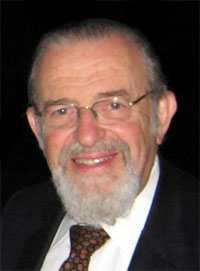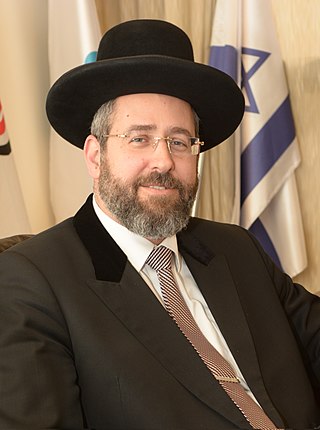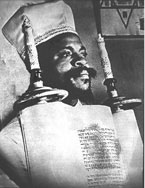Related Research Articles
The subject of homosexuality and Judaism dates back to the Torah. The book of Vayikra (Leviticus) is traditionally regarded as classifying sexual intercourse between males as a to'eivah that can be subject to capital punishment by the current Sanhedrin under halakha.
A rabbi is a spiritual leader or religious teacher in Judaism. One becomes a rabbi by being ordained by another rabbi—known as semikha—following a course of study of Jewish history and texts such as the Talmud. The basic form of the rabbi developed in the Pharisaic and Talmudic eras, when learned teachers assembled to codify Judaism's written and oral laws. The title "rabbi" was first used in the first century CE. In more recent centuries, the duties of a rabbi became increasingly influenced by the duties of the Protestant Christian minister, hence the title "pulpit rabbis", and in 19th-century Germany and the United States rabbinic activities including sermons, pastoral counseling, and representing the community to the outside, all increased in importance.

Messianic Judaism is a modernist and syncretic sect that considers itself Jewish. Many consider it a part of the Christian movement of evangelicalism.
Jewish religious movements, sometimes called "denominations", include diverse groups within Judaism which have developed among Jews from ancient times. Today in the west, the most prominent divisions are between traditionalist Orthodox movements and modernist movements such as Reform Judaism originating in late 18th century Europe, Conservative originating in 19th century Europe, and other smaller ones.

Conversion to Judaism is the process by which non-Jews adopt the Jewish religion and become members of the Jewish ethnoreligious community. It thus resembles both conversion to other religions and naturalization. The procedure and requirements for conversion depend on the sponsoring denomination. Furthermore, a conversion done in accordance with one Jewish denomination is not a guarantee of recognition by another denomination. Normally, though not always, the conversions performed by more stringent denominations are recognized by less stringent ones, but not the other way around. A formal conversion is also sometimes undertaken by individuals whose Jewish ancestry is questioned or uncertain, even if they were raised Jewish, but may not actually be considered Jews according to traditional Jewish law.

The Abayudaya are a Jewish community in eastern Uganda, near the town of Mbale. They are devout in their practice, keeping kashrut and observing Shabbat. There are several different villages where the Abayudaya live. A community that converted to Judaism in the 20th century, most community members are affiliated with the Reform and Conservative movements of Judaism. In June 2016, Rabbi Shlomo Riskin led a Beit Din that performed an Orthodox conversion for the Putti community of Abayudaya.

African Jewish communities include:

Norman Lamm was an American Modern Orthodox rabbi, scholar, academic administrator, author, and Jewish community leader. He was the Chancellor of Yeshiva University until he announced his retirement on July 1, 2013.
"Who is a Jew?" is a basic question about Jewish identity and considerations of Jewish self-identification. The question pertains to ideas about Jewish personhood, which have cultural, ethnic, religious, political, genealogical, and personal dimensions. Orthodox Judaism and Conservative Judaism follow Jewish law (Halakha), deeming people to be Jewish if their mothers are Jewish or if they underwent a halakhic conversion. Reform Judaism and Reconstructionist Judaism accept both matrilineal and patrilineal descent as well as conversion. Karaite Judaism predominantly follows patrilineal descent as well as conversion.
Putti is a village in the Pallisa District of Uganda. Putti is inhabited largely by the Abayudaya people. The villagers of Putti are currently undergoing an Orthodox Jewish conversion to Judaism.

The Chief Rabbinate of Israel is recognized by law as the supreme rabbinic authority for Judaism in Israel. The Chief Rabbinate Council assists the two Chief Rabbis, who alternate in its presidency. It has legal and administrative authority to organize religious arrangements for Israel's Jews. It also responds to halakhic questions submitted by Jewish public bodies in the Diaspora. The Council sets, guides, and supervises agencies within its authority.

Wentworth Arthur Matthew, a West Indian immigrant to New York City, was the founder in 1919 of the Commandment Keepers of the Living God, a Black Hebrew congregation. It was influenced by the pan-Africanism and black nationalism of Marcus Garvey from Jamaica. Matthew developed his congregation along Jewish lines of observance and the theory that they were returning to Judaism as the true Hebrews. He incorporated in 1930 and moved the congregation to Brooklyn. There he founded the Israelite Rabbinical Academy, teaching and ordaining African-American rabbis. His theory of Black Hebrews is not accepted by Jews.
Capers C. Funnye Jr. is an African-American Conservative rabbi, who leads the 200-member Beth Shalom B'nai Zaken Ethiopian Hebrew Congregation of Chicago, Illinois, assisted by rabbis Avraham Ben Israel and Joshua V. Salter.

Yearning to Belong is a documentary about the Abayudaya Jews in Uganda and their struggle to be recognized by the international Jewish community.
The Leadership Council of Conservative Judaism, also known as the LCCJ, is a council made up of members of the various arms of the Conservative movement, a formal movement within the Jewish denomination of Conservative Judaism.

Israel–Uganda relations refers to the current and historical relationship between Israel and Uganda. Neither country has a resident ambassador. Uganda has a non-resident ambassador in Cairo.
The first openly lesbian, gay, bisexual, and transgender clergy in Judaism were ordained as rabbis and/or cantors in the second half of the 20th century.
Masorti Olami is the international umbrella organization for Masorti Judaism, founded in 1957 with the goal of making Masorti Judaism a force in the Jewish world. Masorti Olami is affiliated with communities in over 36 countries, representing with partners in Israel and North America close to two million people worldwide, both registered members and non-member identifiers. Masorti Olami builds, renews, and strengthens Jewish life throughout the world, with efforts that focus on existing and developing communities in Europe, Latin America, the former Soviet Union, Africa, Asia, and Australia. More than 140 kehillot (communities) are affiliated with Masorti Olami in Argentina, Aruba, Australia, Bolivia, Brazil, Chile, Colombia, Cuba, the Czech Republic, Ecuador, El Salvador, France, Germany, Honduras, Hungary, India, Israel, Italy, Japan, Kenya, Mexico, the Netherlands, Paraguay, Peru, Poland, Portugal, Russia, South Africa, Spain, Sweden, Uganda, Ukraine, Uruguay, the United Kingdom and additionally, more than 600 in Canada and the United States and over 80 communities in Israel. All of Masorti Olami's activities are conducted within the context of the overall Conservative Judaism movement, in close cooperation with its affiliated organizations in North America and Israel. The current executive director is Rabbi Mauricio Balter.
This is a timeline of LGBT Jewish history, which consists of events at the intersection of Judaism and queer people.
Black Judaism is Judaism that is practiced by communities of African descent, both within Africa and within the African diaspora, including North America, Europe, Israel, and elsewhere. Significant examples of Black Judaism include Judaism as it is practiced by Ethiopian Jews and African-American Jews. Jews who may be considered Black have existed for millennia, with Zipporah sometimes considered to be one of the first Black Jews who was mentioned within Jewish history.
References
- 1 2 "Over 250 Africans convert to Judaism in Uganda," Jerusalem Post, 16 July 2008 [ permanent dead link ]
- ↑ http://fr.jpost.com/servlet/Satellite?cid=1215331079553&pagename=JPost/JPArticle/ShowFull%5B%5D
- 1 2 "An evening with Rabbi Gershom Sizomu," Canadian Jewish News, 3 November 2008
- ↑ "Out of Africa, Into the Valley," The Jewish Journal, 26 February 2004
- ↑ "Ugandan Jews' prayers ignored," The Guardian, 7 March 2004
- ↑ "Staff,"Institute for Jewish & Community Research
- ↑ "Ugandan community boasts five synagogues," Canadian Jewish News, 28 November 2008
- ↑ "Rabbi Runs for Parliament"
- ↑ Kestenbaum, Sam. "Uganda Rabbi Wins Opposition Seat in Parliament as Authoritarian Leader Clings to Power", The Forward, 24 February 2016.